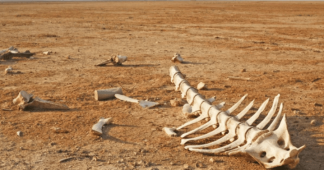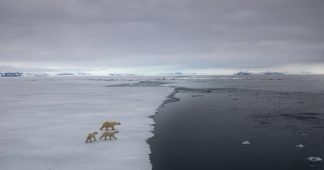In a letter published in Frontiers in Conservation Science, 17 scientists called for a World War II-type mobilization to prevent a future of mass extinction, declining health, climate-disruption upheavals and resource conflicts.
By Jessica Corbett
Jan. 15, 2021
In an example to the rest of the scientific community and an effort to wake up people — particularly policymakers — worldwide, 17 scientists penned a comprehensive assessment of the current state of the planet and what the future could hold due to biodiversity loss, climate disruption, human consumption and population growth.
“Ours is not a call to surrender — we aim to provide leaders with a realistic ‘cold shower’ of the state of the planet that is essential for planning to avoid a ghastly future,” according to the perspective paper, co-authored by experts across Australia, Mexico, and the U.S., and published in the journal Frontiers in Conservation Science.
Co-author Paul R. Ehrlich of Stanford University’s Center for Conservation Biology — who has raised alarm about overpopulation for decades — told Common Dreams his colleagues “are all scared” about what’s to come.
“Scientists have to learn to be communicators,” said Ehrlich, citing James Hansen’s warning about the consequences of “scientific reticence.” Hansen, a professor at Columbia University’s Earth Institute and former director of the NASA Goddard Institute for Space Studies, testified to Congress about the climate crisis in 1988.
Ehrlich was straightforward about how “extremely dangerous things are” now and the necessity of a “World War II-type mobilization” to prevent predictions detailed in the paper: “a ghastly future of mass extinction, declining health, and climate-disruption upheavals (including looming massive migrations), and resource conflicts.”
“What we are saying might not be popular, and indeed is frightening. But we need to be candid, accurate, and honest if humanity is to understand the enormity of the challenges we face in creating a sustainable future,” said co-author Daniel T. Blumstein of the Institute of the Environment and Sustainability at the University of California, Los Angeles, in a statement about the paper.
“By scientists’ telling it like it is, we hope to empower politicians to work to represent their citizens, not corporate, constituents,” he said in an email to Common Dreams.
The paper, Ehrlich and Blumstein pointed out, comes in the midst of the coronavirus pandemic — which, according to Johns Hopkins University, has killed nearly two million people. Over the past year, the COVID-19 crisis has provoked calls for humanity to end its destruction of the natural world to prevent future public health catastrophes.
“We’re all seeing the shocks to our global systems now from COVID and the rise of authoritarian leaders,” Blumstein said. “Because our current ways of life are ecologically unsustainable (we’re living in an ecological Ponzi scheme), we fully anticipate more — and more deadly — pandemics in the future. We expect civil unrest, wars, and famines. We are all shaken by the likelihood of the collapse of civilization as we know it.”
From extreme hurricanes to droughts to wildfires, the climate crisis killed 262 people and cost $95 billion last year.
This is not the new normal. This emergency will continue to get exponentially worse if we maintain the status quo.https://t.co/xRIG0NHzwy
— Friends of the Earth (Action) (@foe_us) January 13, 2021
The new warning from scientists, Blumstein noted, cites over 150 other papers “documenting the diverse and shocking decline in biodiversity and planetary ‘health’ and their consequences.” Among the cited sources is a World Wide Fund for Nature (WWF) report that in September, 2020 revealed an “average 68% decrease in population sizes of mammals, birds, amphibians, reptiles, and fish between 1970 and 2016.”
“In the midst of a global pandemic, it is now more important than ever to take unprecedented and coordinated global action to halt and start to reverse the loss of biodiversity and wildlife populations across the globe by the end of the decade, and protect our future health and livelihoods,” WWF International director general Marco Lambertini said at the time.
The co-authors — including William J. Ripple of Oregon State University, who last year led thousands of scientists in declaring a climate emergency and earlier this month led a call for “a massive-scale mobilization to address the climate crisis” — echoed Lambertini’s message while also underscoring the importance of increasing awareness about what’s actually needed.
“Humanity is causing a rapid loss of biodiversity and, with it, Earth’s ability to support complex life. But the mainstream is having difficulty grasping the magnitude of this loss, despite the steady erosion of the fabric of human civilization,” the paper says.
Biodiversity is the thread of life on Earth.
?️?????????????????
Learn more about what #biodiversity is and why it matters for all of us in #GBO5.
Video via @IPBESpic.twitter.com/P0rDTrrYQs
— UN Biodiversity (@UNBiodiversity) January 9, 2021
“In fact, the scale of the threats to the biosphere and all its lifeforms is so great that it is difficult to grasp for even well-informed experts,” said lead author Corey Bradshaw of Australia’s Flinders University in a statement. “The problem is compounded by ignorance and short-term self-interest, with the pursuit of wealth and political interests stymieing the action that is crucial for survival.”
The paper explains that “while suggested solutions abound, the current scale of their implementation does not match the relentless progression of biodiversity loss and other existential threats tied to the continuous expansion of the human enterprise.” According to its authors, “That we are already on the path of a sixth major extinction is now scientifically undeniable.”
“With such a rapid, catastrophic loss of biodiversity, the ecosystem services it provides have also declined,” the paper explains. Consequences include “reduced carbon sequestration, reduced pollination, soil degradation, poorer water and air quality, more frequent and intense flooding and fires, and compromised human health.”
Highlighting estimates that the human population will near 10 billion by 2050, the scientists lay out how “large population size and continued growth are implicated in many societal problems,” from food insecurity, soil degradation, biodiversity loss and an increased chance of pandemics, to crowding, joblessness, deteriorating infrastructure and bad governance.
Published at childrenshealthdefense.org











